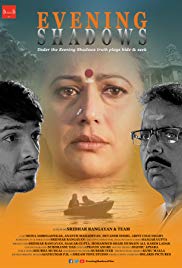
EVENING SHADOWS
India, 2018, 102 minutes, Colour.
Mona Ambegaonkar, Devansh Doshi, Ananth Narayan Mahadevan.
Directed by Sridhar Rangayan.
Evening Shadows is an Indian film that was screened widely, at a number of festivals.
The subject of the film is topical, especially in India, highlighting legislation about homosexuality, aspects of criminality, protests against the legislation.
The film offers an opportunity, a fairly gentle opportunity, a kind of PG-rated opportunity, for Indian parents to look at gay issues for their children, the difficulties for their coming out of the closet, cultural and social stigma.
The film focuses on a young man who has become a celebrity photographer in Mumbai and lives with his partner, his family thinking that he simply has a roommate. He returns to his family for some religious ceremonies, they being unaware of his sexual orientation (except an uncle who propositions him on his return and it is revealed that the uncle initiated him into sexual behaviour). While watching television news about the legislation, the young man’s father states that the behaviour is disgusting and the perpetrators should be executed.
The young man is cheerful, loving with his family, his father expecting him to enter into an arranged marriage with a childhood friend. Family and people in the town readily gossip about the fact that he is not married and speculate why.
His mother, who had not met her husband before the wedding, is a genial woman, but quite oppressed by her humourlessly domineering husband, treating her like a servant, dismissive of her, a dramatisation of an exceedingly Indian-cultural patriarchy.
The young man is in contact with his roommate by phone, conscious of legislation and voting about homosexuality on that day.
The young man takes mother for a drive – and, so much of the film is very pretty, beautiful landscapes and water in this area of southern India. Eventually, he tells the truth to his mother and she is extremely shocked, sad, finding it difficult to cope. She imagines him dressed in cross-sexual clothing, he imagining her to be so upset that she would kill herself.
When they are obliged to stay the night at a hotel because the car breaks down, his mother gradually begins to understand – and, on the return home, when the father finds photos of his son and his roommate on his computer and formulates against his son, fighting him, ousting him from the house, his mother stands her ground, a fine speech about her role as a mother, nine months having him in the womb, bringing him up as a child, as an adult. The father is stunned by this outburst – and the film ends without the father really reconciling with his son.
Many Western culture audiences have been through many films on this theme – so it is interesting to see an Indian version, presented more quietly than might be expected, an emphasis that gay relationships are based on feelings, love, relationships more than any sexual encounters and behaviour.